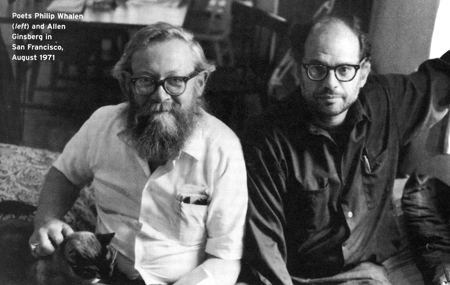
Philip Whalen, Zen priest, abbot of San Francisco’s Hartford Street Zen Center, and Beat poet, died on June 26, 2002, at the age of seventy-eight, after a prolonged illness. Born in Portland, Oregon in 1923, Whalen was associated with the West Coast Beats and appeared with Allen Ginsberg and Gary Snyder in the legendary Gallery Six reading in 1955, which brought the San Francisco Poetry Renaissance to national attention. “[He was] one of the most influential and inspiring poets of the last century,” according to poet Anne Waldman of Naropa University. Whalen’s interest in Buddhism first led him to Japan, and then to the San Francisco Zen Center, where he ordained as a priest with Richard Baker Roshi in 1973, eventually receiving the dharma name Zenshin Ryufu.
After serving in Asia during World War II, Whalen attended Reed College with fellow poets Gary Snyder and Lew Welch. “I became a poet by accident,” said Whalen in 1986, with characteristic self-deprecation. “I still don’t know what it’s all about.” Nevertheless, he became one of the most important voices of the Beat Generation, producing numerous books of poetry, including On Bear’s Head in 1967 and the 1999 retrospective Overtime. “He simply wrote, with enormous originality, exactly what he was feeling and thinking,” says poet and Zen teacher Norman Fischer. “No one had ever done this with quite this degree of nakedness.”
In recent years Whalen devoted himself primarily to Zen practice. Having completed formal training, he became abbot at Hartford Street in 1991.
“When I saw him several months ago,” recalls Waldman, “he was lucid, kind, crotchety, funny, a twinkling cosmic ‘jokiness’ in his blind eyes. A great, large, hulking gem of a being who radiated immense curiosity always. He was a tremendous spiritual inspiration.” In a 1965 poem, Whalen wrote: “The cherry trees will blossom every year, but I’ll disappear for good, one of these days.” His legacy as a poet and dharma teacher, however, will clearly live on. ▼
Thank you for subscribing to Tricycle! As a nonprofit, we depend on readers like you to keep Buddhist teachings and practices widely available.